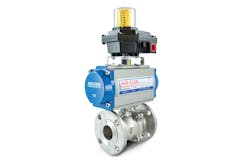In the process industries, many valve types are used for process control. This article features several different control valve types, their functions and positioners.
The quarter-turn control ball valve design is generally used to control liquids in throttling applications in which direct control of flow rates dealing with pressure, temperature and liquid levels are critical. The opening and closing of control valves is usually performed by pneumatic, electric or hydraulic actuators.
For modulating applications where any position from fully open to fully closed is required, valve positioners are used to regulate the desired degree of opening. Smart positioners are typically used today in conjunction with sophisticated manufacturing control systems.
In combination with segmented balls, the functionality of globe valve characteristics is married with the efficiency of rotary type ball valves. The segmented ball is a V-notch design with powerful cutting force and a self-cleaning mechanism. It is especially suitable for the control media that contains fiber and small solids.
Originally designed for pulp and paper applications, further research and development using segmented ball valves has extended their use to petroleum, petrochemical, power, chemical, fiber and many more flow control applications.
Precise contouring of the V-notch provides excellent control characteristics for an extensive array of flow applications. An ideal control performance is designed into the geometry of the ball for critical management of flow. A locked ball-to-shaft connection ensures that motion is not lost during critical control periods.
A splined connection between the shaft and ball ensures precise control of low hysteresis. A streamlined flow passage provides maximum efficiency and minimizes erosion inside the valve’s body.
Additionally, the detachable seat retainer design provides easy access to trim parts of the valves through their inlets by simply removing screws on the retainer allowing for easy maintenance. Repair kits are readily available for all valve designs.
Superior engineered trunnion bearing technology provides for excellent abrasion resistance. Rugged, self-adjusting metal seat options make these valves ideally suited for high temperature applications and slurries. Spring-loaded seats maintain constant contact with the ball, providing enhanced sealing performance. Shearing action between the ball and seat in these valves promotes smooth, non-clogging operation, which is ideal for fibrous or slurry applications.
Optional special materials can be impregnated directly into all the wetted surfaces of the valve that can help prevent the buildup of scale often found in green liquor and other severe applications.
Lastly, many trim designs are also available for low flow coefficient (Cv) and noise applications – For example, when the flow rate in an application is too low, requiring valves with very low Cv for throttling, that the standard trim on ¾- or 1-inch segmented ball valves cannot manage to achieve. These are engineered to provide precise throttling performance that meets the control requirements of additives and coatings in the paper industry.
Considering all that is available, the use of control valves in a variety of new applications is becoming more commonplace in the process control industry.
Robert M. Donnelly is the vice president of marketing for Flo-Tite Valves & Controls, a supplier of ball valves and valve automation components. Donnelly has been in the industrial valve marketplace for 30 years and is well known as a brand builder.

